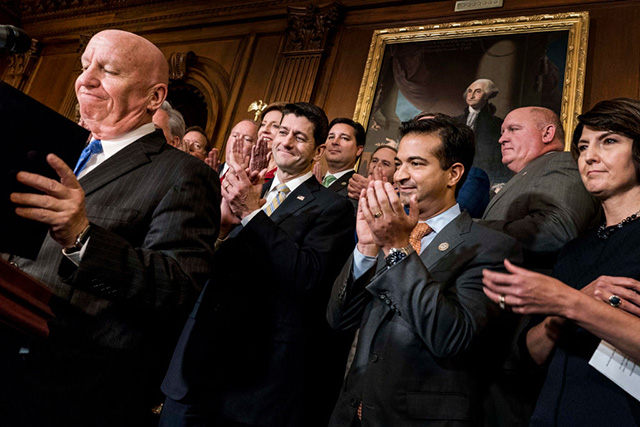
Truthout is a vital news source and a living history of political struggle. If you think our work is valuable, support us with a donation of any size.
 Speaker of the House Paul Ryan along with his leadership, Republican Conference Chairperson Cathy McMorrison-Rogers, right, and House Ways and Means Chairman Kevin Brady, left, celebrate the passage of the House Tax Bill on Capitol Hill in Washington, DC, Thursday, November 16, 2017. (Photo by Melina Mara / The Washington Post via Getty Images)
Speaker of the House Paul Ryan along with his leadership, Republican Conference Chairperson Cathy McMorrison-Rogers, right, and House Ways and Means Chairman Kevin Brady, left, celebrate the passage of the House Tax Bill on Capitol Hill in Washington, DC, Thursday, November 16, 2017. (Photo by Melina Mara / The Washington Post via Getty Images)A massive overhaul of the US tax code that showers benefits on business owners and high income earners passed out of the House of Representatives on Thursday.
The measure was approved mostly along party lines in a 227-205 vote, shortly after President Donald Trump arrived on Capitol Hill for a meeting with Republican lawmakers. Not a single Democrat supported the bill. Thirteen Republicans voted against it.
During debate over the legislation, Democratic House Minority Leader Nancy Pelosi (D-CA) accused her colleagues on the other side of the aisle of “pillaging the middle class.”
“It’s not tax reform. It’s not even a tax cut,” she said. “It’s a tax scam.”
The bill comes with a price tag of $1.5 trillion, with a majority of those costs stemming from a drastic reduction in the pre-deduction corporate tax rate from 35 percent to 20 percent.
Although the nation’s wealthiest individuals don’t see a reduction in their income tax rates, they would be let off the hook from paying the estate tax, which is completely phased out under the House proposal.
Middle and working class Americans would see lower rates and an increase in the standard deduction. But a bipartisan office on Capitol Hill, the Joint Committee on Taxation, found that, under the plan, individuals who earn $75,000 or less would actually see their taxes go up in 2027.
On the other side of the Capitol, the Senate’s tax cut bill is still being considered in committee, and the upper chamber doesn’t expect a final vote on the package until after Thanksgiving. Their bill already includes substantial differences from the House version that will have to be reconciled before the package can eventually be passed into law.
One major change that could be in the final Senate proposal: a repeal of the Affordable Care Act’s individual mandate, which compelled Americans to obtain health insurance. Republicans on the Senate Finance Committee tucked the repeal language into their bill, with the backing of party leadership.
“We’re optimistic that inserting the individual mandate repeal would be helpful,” Senate Majority Leader Mitch McConnell (R-KY) said this week.
The maneuver marks another effort by the GOP to critically would the signature health reform law passed under President Obama. But it could also imperil broader tax cut legislation.
“I personally think that it complicates tax reform,” Sen. Susan Collins (R-Maine) told reporters on Tuesday.
A terrifying moment. We appeal for your support.
In the last weeks, we have witnessed an authoritarian assault on communities in Minnesota and across the nation.
The need for truthful, grassroots reporting is urgent at this cataclysmic historical moment. Yet, Trump-aligned billionaires and other allies have taken over many legacy media outlets — the culmination of a decades-long campaign to place control of the narrative into the hands of the political right.
We refuse to let Trump’s blatant propaganda machine go unchecked. Untethered to corporate ownership or advertisers, Truthout remains fearless in our reporting and our determination to use journalism as a tool for justice.
But we need your help just to fund our basic expenses. Over 80 percent of Truthout’s funding comes from small individual donations from our community of readers, and over a third of our total budget is supported by recurring monthly donors.
Truthout has launched a fundraiser to add 460 new monthly donors in the next 8 days. Whether you can make a small monthly donation or a larger one-time gift, Truthout only works with your support.